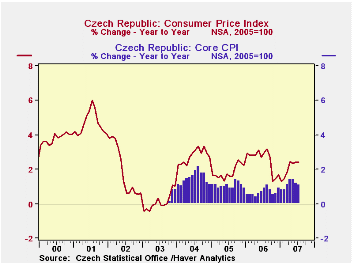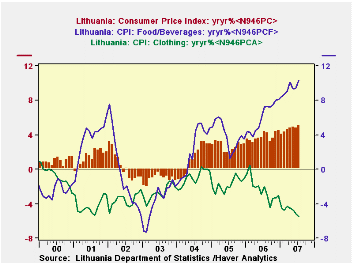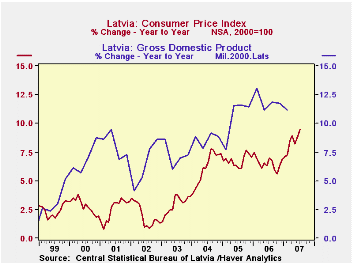 Global| Aug 08 2007
Global| Aug 08 2007CPI Inflation Restrained in Czech Republic, Moderate in Lithuania and Very Fast in Latvia
Summary
Consumer price behavior varies widely in Central and Eastern Europe, apparently depending on the degree of development in various economies. In the Czech Republic, inflation is slow and restrained, much like that in Western Europe, [...]

Consumer price behavior varies widely in Central and Eastern Europe, apparently depending on the degree of development in various economies. In the Czech Republic, inflation is slow and restrained, much like that in Western Europe, while Lithuania and Latvia show inflationary tendencies quite distinct from their larger regional neighbor. All three countries reported CPI data for July today.
In the Czech Republic, the total CPI was up just 0.3% in the month and 2.3% from July 2006. A measure of "core" prices, which excludes regulated prices and taxes, was up 0.2% in the month and 1.1% from a year ago. On a year-over-year basis, which is the easiest way to compare the three countries, health care, housing and alcohol have the largest increases in the Czech Republic, running about 3 to 4% for the first two, while alcohol is up 10.8%. Food prices are up 2.5%, an increase close to that in the overall index. Clothing, which had been declining, was unchanged in July from July 2006. Prices of recreational activities, communications and transportation are all down slightly from a year ago.
In Lithuania, the CPI in July was up 0.7% from June and 5.1% from a year ago. Food prices there have risen 10.3% year-to-year, in an acceleration that began last October. Housing costs are up 11.2%, also gaining more rapidly since last October. Restaurants and hotels see almost a double-digit increase, 9.8%. Other sectors have less extreme inflation, with prices of clothing and communications actually down from their year-ago levels. Home furnishings are up just 1.9%.
Inflation in Latvia runs an order of magnitude higher even than in Lithuania. Over the latest 12 months, it was 9.5%, including 1.6% in July from June. As in Lithuania, communications prices are down and clothing prices are the next weakest category. But food prices are up 12.2% in the past year and housing costs 15.1%. Restaurant prices and hotel rates went up 16.6%. Overall, the Latvian economy encompasses rapid real growth, more than 11% year-to-year in Q1, the latest figure. Employment then was 2.5% higher than a year ago and productivity (calculated by Haver as GDP per employee) gained an impressive 8.5%. Money growth, however, been very fast at 28.7% in Q2, although this is down from 40%+ expansion during 2006. The currency, the lat, is held steady with the euro, and the country's trade deficit is widening noticeably. Thus, Latvia appears to be a rapidly changing economy and persistent high inflation is part of the mix. 

| CPI % Changes | July 2007 June 20072006 | 2005 | 2004 | ||||
|---|---|---|---|---|---|---|---|
| Mo/Mo | Yr/Yr | Mo/Mo | Yr/Yr | ||||
| Lithuania | 0.7 | 5.1 | 0.2 | 4.8 | 3.7 | 2.7 | 1.2 |
| Latvia | 1.6 | 9.5 | 1.0 | 8.8 | 6.5 | 6.8 | 6.2 |
| Czech Rep, Total | 0.29* | 2.3 | 0.29* | 2.5 | 2.5 | 1.8 | 2.8 |
| Core | 0.23 | 1.1 | 0.17 | 1.2 | 0.7 | 1.1 | 1.5 |
Carol Stone, CBE
AuthorMore in Author Profile »Carol Stone, CBE came to Haver Analytics in 2003 following more than 35 years as a financial market economist at major Wall Street financial institutions, most especially Merrill Lynch and Nomura Securities. She had broad experience in analysis and forecasting of flow-of-funds accounts, the federal budget and Federal Reserve operations. At Nomura Securities, among other duties, she developed various indicator forecasting tools and edited a daily global publication produced in London and New York for readers in Tokyo. At Haver Analytics, Carol was a member of the Research Department, aiding database managers with research and documentation efforts, as well as posting commentary on select economic reports. In addition, she conducted Ways-of-the-World, a blog on economic issues for an Episcopal-Church-affiliated website, The Geranium Farm. During her career, Carol served as an officer of the Money Marketeers and the Downtown Economists Club. She had a PhD from NYU's Stern School of Business. She lived in Brooklyn, New York, and had a weekend home on Long Island.
More Economy in Brief
 Global| Feb 05 2026
Global| Feb 05 2026Charts of the Week: Balanced Policy, Resilient Data and AI Narratives
by:Andrew Cates





